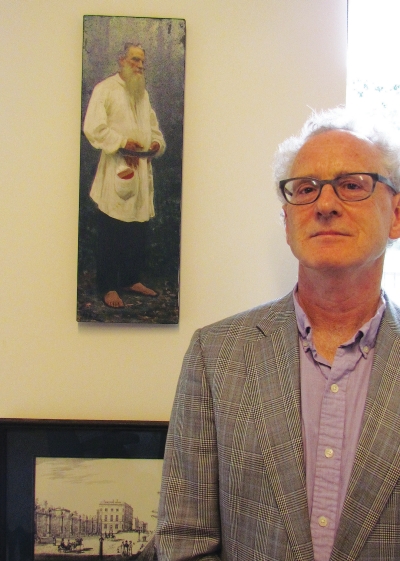
By
You might say Thomas Epstein, an adjunct associate professor in the College of Arts and Sciences Honors Program, is pretty well-acquainted with Russia: He’s visited there 47 times over the past 24 years.
But Epstein is hardly blasé about the prospect of his 48th visit, which will take place from January to June next year. Supported by a Council for International Exchange of Scholars Fulbright fellowship, Epstein will spend the semester in Saint Petersburg, teaching English at Smolny College and continuing his research on the city’s legendary Soviet-era “Underground” arts movement.
“I’m very happy at being selected for this fellowship,” said Epstein, adding that his upcoming sojourn not only represents a fulfillment of professional and personal opportunities, but also carries potential benefits for Boston College. “BC has a long history with Saint Petersburg, thanks to our productive Slavic and Eastern Languages Department. I’m hoping to strengthen those ties, through working with Smolny and the Dostoevsky Museum, and hopefully pave the way for more BC faculty and students to discover the city’s rich culture and history.”
A member of the A&S Honors faculty since 1998 — he also has an appointment in Slavic and Eastern Languages — Epstein focuses his research on Russian poetry of the late 20th century through the present, with particular interest in Saint Petersburg’s Underground. Epstein describes this artistic and literary movement — exemplified by such figures as Joseph Brodsky, Yelena Shvarts, Viktor Krivulin, and Arkady Dragomoshchenko — as a fascinating universe of personalities and styles that was a key facet in Russia’s transition from late- to post-Soviet society.
“While it might be described as counter-culture, the ‘Underground’ was not, as the name might imply, dissident or non-conformist,” he explains. “There is some similarity to the US ‘beat’ culture, but the Underground had far more of a religious orientation to it. Where the Soviet period was modernist, and religion and other aspects of Russian culture were suppressed, the Underground played a vital role in reenergizing the medium of cultural memory.
“When the Soviet Union collapsed in the early ‘90s, and the ‘new Russia’ emerged, this cultural memory remained and thus functioned as a link to Russia’s past.”
Although the Underground by and large often pushed the limits of Soviet authoritarianism, the state shied away from cracking down on its proponents, Epstein says. “In Saint Petersburg was a bar called ‘Saigon’ — where you could get a nice triple espresso — that was essentially the Grand Central Station of the Underground. The KGB decided to tolerate it, because that made keeping tabs on everyone easier, since they would invariably all be at Saigon.
“When he was a KGB officer in Saint Petersburg, Vladimir Putin would’ve almost certainly walked by it,” he adds, “although, of course, he never would’ve gone in.”
Epstein, whose research on the Underground combines translation, essays and interviews with figures from the movement, is equally enthused about the teaching portion of his Fulbright at Smolny, Russia’s first liberal arts college.
“My experience as a faculty member at a Jesuit, Catholic university, working in the A&S Honors Program as well as Slavic and Eastern Languages, has sensitized me to a more humanistic style of teaching that is not a tradition in Russian higher education,” he said. “It’s a sensibility I’ll be able to bring to classes and discussions, in areas such as translation and comparative poetics, at Smolny.”
Among Epstein’s publications are the essay “My Petersburg” for a magazine commemorating the city’s 300th anniversary, and articles for The Literary Review, New Arcadia Review, Slavic Review and Slavic and Eastern European Journal. His honors include a grant from Artslink/NEA for editorial contributions to the volume Closing the Millennium: Russian Poetry at the End of the Century.



